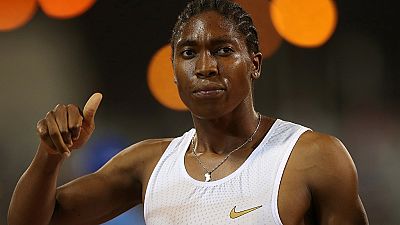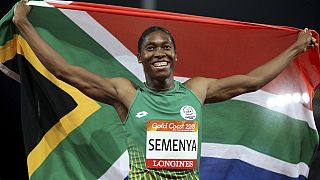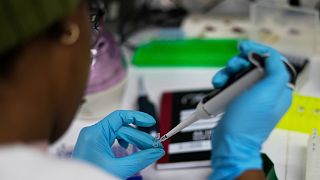South Africa
Athletics SA (ASA) has joined the fray against the new International Association of Athletics Federations (IAAF) female eligibility rules and formally lodged its statement of appeal with the Court of Arbitration in Sport (CAS) in Lausanne, Switzerland.
This comes after Caster Semenya announced on Monday she would take the rules on review.
“As a loyal member federation of the IAAF and to that extent, ASA has a duty to protect all its athletes, including female athletes who may fall foul of these regulations,” the ASA said on Saturday.
Athletics South Africa has lodged its statement of appeal to the Court of Arbitration in Sport which will challenge the IAAF’s new regulations concerning athletes with hyperandrogenism. The ruling is seen to target SA’s World and Olympic champion Caster Semenya. pic.twitter.com/nHiWo9MW2R
— ZiFM News (@ZiFMNews) June 24, 2018
Athletics South Africa confirm that it has formally lodged an appeal with CAS in relation to the IAAF’s Eligibility Regs on the basis that they discriminate against certain female athletes which is an infringement on their human right to dignity #Semenya https://t.co/3VzEM4txEg
— Laura Sports Law (@laurasportslaw) June 23, 2018
The ASA has engaged the IAAF directly since May 10, declaring its intention to oppose the implementation of the regulations.
“Subsequently, the IAAF’s legal representatives have been corresponding with lawyers appointed by ASA to represent its interests.”
IAAF Hyperandrogenism rule
The IAAF introduced a new policy in April attempting to regulate women who naturally produce testosterone levels above five nanomoles per litre of blood. For now, the regulations are limited to athletes who compete in events ranging from 400m to the mile. The ASA said it had requested a meeting with the IAAF executive, with the SA federation’s president Aleck Skhosana set to meet the parent body’s head, Lord Sebastian Coe, in the coming week.
It has also applied for the implementation of the regulations to be suspended pending the outcome of the CAS arbitration. The IAAF during the week said it would “stand ready” to defend its new female eligibility rules after the CAS confirmed an arbitration procedure had been opened.
“The Court of Arbitration for Sport has informed the IAAF this morning (Tuesday) that it has received a request for arbitration filed by Caster Semenya vs/ IAAF,” the IAAF said in a statement.
“We await further information and stand ready to defend the new regulations.”
Semenya’s lawyers released a statement on Monday saying their client would challenge the IAAF’s rules “to ensure, safeguard and protect the rights of all women”.
The ASA’s challenge is led by a legal and medical team supported by the Department of Sport and Recreation and the SA Sports Confederation and Olympic Committee.
Athletics South Africa appeals over female classification rules #IAAF #ASA #CasterSemenya https://t.co/baVl1rotEo pic.twitter.com/PdnLDP6vJb
— Africa News 24-7 (@AfricaNews24_7) June 24, 2018
Athletics South Africa has formally lodged its statement of appeal to challenge the IAAF’s rule change on testosterone levels at the Court of Arbitration in Sport #SSAthletics
— SuperSport Blitz (@SuperSportBlitz) June 23, 2018
The SA athletics body said in its statement of appeal it contends the regulations “discriminate impermissibly against certain female athletes on the basis of natural physical characteristics, and/or sex”.
“The regulations, and their implementation, constitute an infringement of the right of the affected female athletes to a private life, which includes the right to the protection of a person’s physical, moral and psychological integrity, as well as the right to choose or to exercise personal autonomy. These are inviolable human rights.
“There is insufficient scientific evidence to assert that testosterone is the predominant factor which causes male athletes to perform substantially better than female athletes and, accordingly, if testosterone does not determine male performance, it can logically not define the difference between male and female performance.
“There is insufficient scientific evidence that: (a) endogenous testosterone significantly improves athletic performance in female athletes; and (b) 5nmol/L is the scientifically correct threshold at which female athletes are in the “normal range” of endogenous testosterone for females.
“The regulations are disproportionate in the context of: (a) the fact that they discriminate on the basis of a natural physical characteristic and/or sex; (b) violate fundamental human rights of affected athletes.”
Caster Semenya to challenge #IAAF testosterone rule in court
“I am very upset that I have been
pushed into the public spot light again. I don’t like talking about this new rule. “I just want to run naturally, the way I was born” #Athletics #SouthAfrica
https://t.co/IMExI6A1cB— Ade Adedoyin (@ade_adedoyin) June 18, 2018
Where is Athletics South Africa??? https://t.co/8lHhBR7qGf
— Motheo (@Motheo_wrote) June 18, 2018
AGENCIES














01:53
SMES under pressure as business confidence hits four-year low in South Africa
Go to video
Former South African deputy president David Mabuza dies at 64
01:05
South Africa: year of power marred by new scandal in coalition government
Go to video
’Black Empowerment’ law stalls Elon Musk's $113 million investment in SA
01:30
Uncertainty looms over Nissan South Africa as global restructuring continues